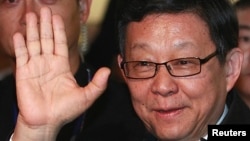China’s top negotiator with Taiwan, a self-ruled island that Beijing claims as its own, is on a visit to keep relations upbeat despite local election results last month. The visit by Chen Deming follows defeats in nine city and county polls for Taiwan's ruling party, which backs strong economic relations with China after more than six decades of hostility.
Beijing's dedicated negotiator with Taiwan told local media this week relations will be unaffected by results of the November 29 elections. Analysts say the Nationalist Party lost three times as many seats as forecast that day partly because of voter fatigue with its China policies.
That showing may weaken the Nationalist government's mandate to extend 21 deals it has signed with China since 2008.
Alexander Huang, strategic studies professor at Tamkang University in Taiwan, said Chen's visit is meant to ease fears of a new decline in relations.
“The function it serves is to prove to Taiwan people that, no matter what [the] election [results are], Taiwan’s domestic political process is one thing. Cross-Strait exchange is bigger than elections. I think that’s the main theme,” said Huang.
Chen arrived in Taiwan Tuesday amid a light crowd of anti-China protesters, and a column of demonstrators also appeared outside a meeting venue in Taipei the next day. He later went to Taiwan's east coast to visit a local enterprise that is developing biotechnology and tourism.
The negotiator is not expected to sign any new agreements with Taiwan, using the time instead to learn about the island’s business climate and assess what led to the ruling party’s election losses.
Ma Shao-chang, spokesman for Taiwan's negotiator to China, told VOA the negotiator wants to study local agriculture, biotechnology and healthcare. Findings could lead to investment proposals from mainland Chinese firms, a boost to the island economy and Beijing's hopes of eventual political unification.
Taiwan's semi-official Central News Agency said Chen made a remark Wednesday that cross-Strait relations would not change course because of the local elections. But the agency also said he warned that a China-South Korea trade deal now in its final stages could take effect sooner than the two years currently expected. Taiwan and South Korea compete for markets, as both economies are dominated by exports, largely to China.
The Central News Agency adds that Chen urged Taiwanese lawmakers to ratify a service trade liberalization pact that the government signed with Beijing in mid-2013 or risk having it sent back to negotiators for a fresh look.
In March, thousands of people occupied parliament and surrounding streets in Taipei to oppose the service trade pact and other links with Beijing. They fear China will use economic ties to push Taiwan toward political unification under Beijing's guidelines, an outcome that government surveys say 70 percent of Taiwanese people oppose.
On Tuesday, Taiwan's defense ministry spokesman said the military wants to buy at least two military frigates from the United States. The U.S. Senate approved the sale of four frigates last week, following House approval of the sale in April. China opposes the sale but Taiwan says it needs to defend itself, as Beijing has not renounced use of force against it if needed.
Taiwan President Ma Ying-jeou looks to agreements with China as support for the economy. Before he took office in 2008, the opposition Democratic Progressive Party angered Beijing with its pursuit of independence from China, making most agreements impossible. That party won seven seats in the November 29 elections.




